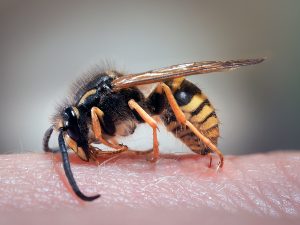Overview
Being allergic to insect stings is like having your immune system sound the alarm a bit too loudly. When certain insects, like bees, wasps, or hornets sting you, your immune system might overreact to the venom they inject. Here in California, and specifically in the Central Valley, we have many of these insects. This can even happen to some people who are bitten by red ants. It’s like your body mistakenly sees these stings or bites as a major threat and goes into superhero mode, releasing substances that cause symptoms like swelling, itching, or difficulty breathing. This heightened response is what we call an allergy. It’s like your immune system being a bit too protective and causing more trouble than the insect sting itself. If you notice severe reactions after an insect sting, it’s crucial to seek medical attention, as allergic reactions can sometimes be serious and even life-threatening.

Diagnosis
If you suspect an allergy, your Clovis allergist will ask about your symptoms and the circumstances surrounding the insect sting or bite. Allergy testing, such as skin tests or blood tests, could be used to identify specific triggers.

Treatment
Once the culprit insects are identified, avoidance becomes the primary strategy. In case of a sting, carrying an epinephrine auto-injector can be a lifesaver. It’s like having an emergency button to calm your immune system if it decides to overreact. With the right diagnosis and an action plan in place, insect sting allergies become very manageable. People with significant allergies to insect venom are candidates for allergen immunotherapy, which is a treatment that involves gradually exposing the person to small, increasing amounts of the venom to build tolerance and reduce the risk of severe reactions. This process aims to teach the body to handle the venom without triggering an exaggerated response, making future stings less dangerous. Learn more about immunotherapy for insect sting treatment by making an appointment with an allergist here in Fresno.
